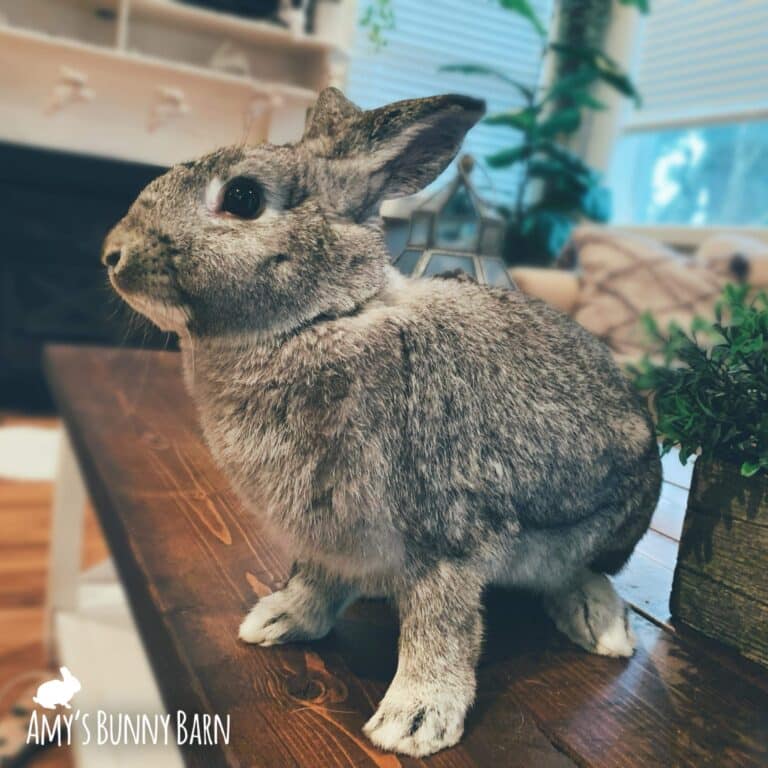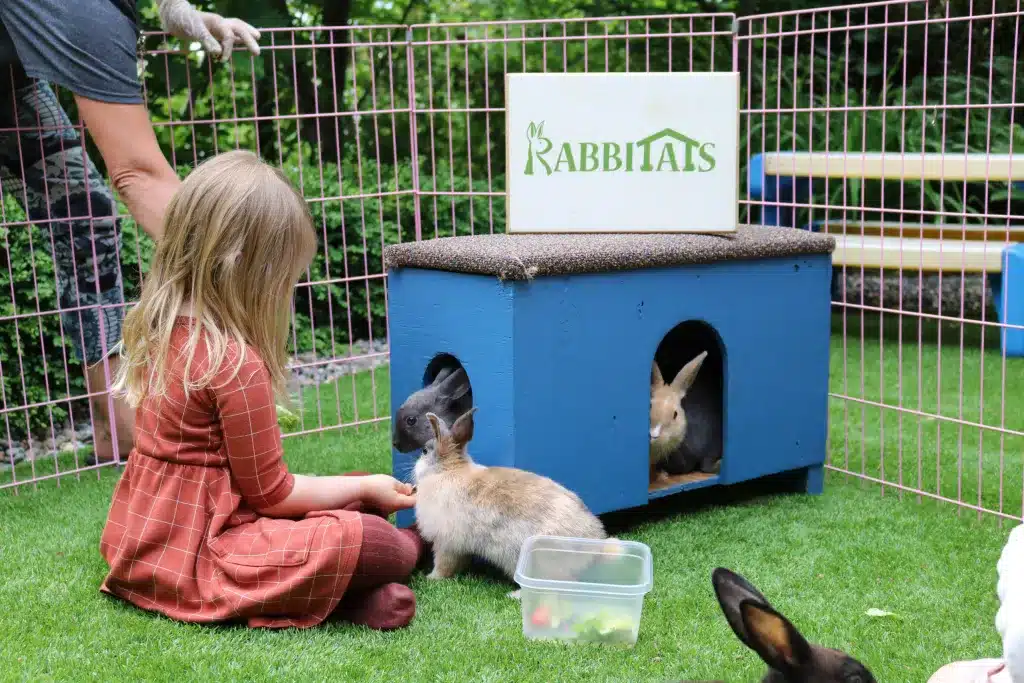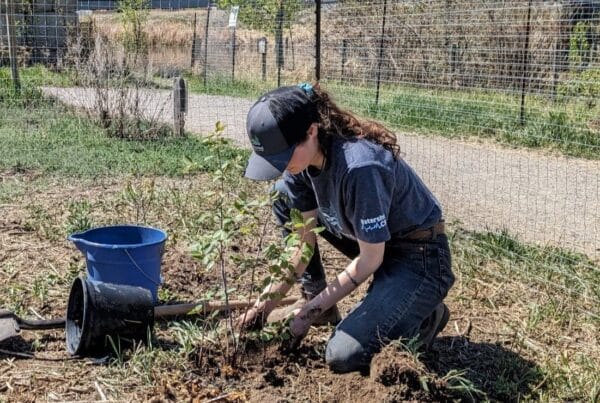By Lisa Houle | April 6, 2023
Bunnies, with their floppy ears and cute noses, are as much a part of Easter as chocolate. But buying or adopting a bunny as an Easter gift is an old-fashioned tradition well past its prime. Too often, rabbits that are no longer a novelty get released into the wild, a practice that introduces an invasive species into the environment. ISCBC is urging you to play your part – avoid the Easter hype and Don’t Let it Loose!
Amy McLaughlin is very familiar with what it takes to care for rabbits. She is the founder of Amy’s Bunny Barn, an animal rescue society in Sooke, BC and has been rescuing rabbits for seven years since working for the SPCA in Victoria for more than a decade. Amy’s Bunny Barn started in 2016 in response to an overwhelming need to house surrendered animals, taking in overflow the SPCA was unable to handle.
Amy started with 20 rabbits in her care when the society opened. Just one year later, that number had doubled to 40. In 2022, over 200 rabbits came through her doors. The number is not surprising, given that shelters on the island and mainland are overwhelmed by surrendered rabbits, most no longer taking them in unless it is an emergency. Amy has had families drive from as far away as Alberta to surrender their animals to her care. She has rescued rabbits dumped on the side of the road and their resulting offspring, always finding a way to shelter abandoned and improperly cared for pets.

Currently running the society from her own home, with support of foster homes, space and resources are the biggest challenges facing Amy’s Bunny Barn.
“We converted our attached garage into the main bunny space. Some bunnies are in my spare bedroom, some are in my office. We also have 19 foster homes with bunnies across Vancouver Island. We have a long waitlist with some people waiting over a year now,” said Amy. “We have to prioritize the bunnies that are returned to our care, and those that have dealt with cruelty and neglect. Every second day – sometimes daily – we get requests for a surrender. The need never ends.”
While the need is overwhelming, with enough education, it is preventable.
“Someone called the other day; they purchased two bunnies from a breeder who said they were the same gender. They weren’t. The female had seven babies. No one told her to remove the male from the cage right away and the female was pregnant again within the month. One accident turned into 14 babies. There’s no one to help and I’m full,” said Amy.
Amy says bunnies can reproduce at four months of age and have a litter every 30 days, with seven to 10 babies in each litter.
“People are getting rid of bunnies online for free or dumping them. Sellers aren’t educating people about how to house them, their behaviours, and the challenges. When bunnies are given away at a young age, it can be difficult to determine their sex, which can lead to misgendering. Part of the problem is people wanting baby bunnies for Easter,” said Amy.
“We do get impulse buyers at this time of year. We screen and educate potential adopters, and if it’s not a good fit, sometimes people get defensive. I have no problem saying no. Some will get a bunny regardless, but not from me. Unfortunately, some of these bunnies end up being surrendered to me. It’s very frustrating.”
Rabbitats Rescue Society operates a shelter and sanctuary in Richmond, and a network of sanctuaries and foster homes throughout the Lower Mainland. Pets are adopted through a partnership with the Bunny Café in East Vancouver. Like other rescues, the sheer number of animals is maxing out resources.

“Our spaces are at capacity based on our current lack of resources – our work is done by volunteers and is donation and grant dependent. There’s only one other official rabbit rescue in the Lower Mainland and they’re at capacity. The municipal shelters and SPCAs are also not taking the vast majority of the rabbits they’re asked to, and few are picking up strays,” said Sorelle Saidman, Founder and Executive Director of Rabbitats Rescue Society. “Non-native domestic rabbits are becoming a problem for municipalities, businesses and neighbourhoods forced to deal with environmentally destructive natural behaviour, like chewing and burrowing. It’s a tragedy for the loose bunnies as they will most likely be killed by predators, parasites, sport hunters or trappers hired for ‘pest control.’ What we need are city bylaws with breeding controls and spay/neuter mandates.”
Rabbitats Rescue Society receives surrender requests through their website and email and reports of abandoned and feral rabbits come through their tracking map. Sorelle attributes the large number of surrender requests this year to people returning to work.
“The people who bought them during the COVID lockdown are now wanting to surrender them. We’re being asked to take rabbits people bought from breeders or off sites like Craigslist,” said Sorelle.
Surrenders due to a return to the workforce is something the Vancouver Rabbit Rescue and Advocacy (VRRA) has also experienced, though consistent rabbit surrenders can be attributed to a lack of education.
“They are the third most popular pet and people don’t do research on how to best keep them before they get one. They think they are cuddly pets for children,” said Olga Betts, founder of VRRA. “It’s a 10-year commitment of care every day and you should have $750 in the bank just in case for vet bills, as they see vets more often than cats or dogs. They are amazingly intelligent, amusing animals but each one is different. They have varying personalities like other animals.”
For those seriously considering adopting a rabbit, Amy’s Bunny Barn recommends they contact a reputable rescue who will find a suitable match based on personality. Bunnies’ personalities are still forming from four months to a year of age.
“Like human babies, bunnies have to be loved, nurtured and fed. Some are cuddly, some aren’t. We have some bunnies that were manhandled and have fearful issues, some are defensive. We spend so much time getting to know the bunnies, if we have one that’s really shy, for example, we won’t adopt it to a family with kids,” said Amy.
“So many people have expectations of what animals should be and that’s unfair,” she said. “Bunnies are amazing, but they won’t show you their personalities if left in tiny cages. They can be litter trained, clicker trained, and you can do agility training with them. They’re pretty amazing creatures and I’m obsessed with them.”

Rabbitats Rescue Society doesn’t want people to shy away from adopting rabbits due to misconceptions.
“European rabbits carry very few zoonotic diseases, they’re one of the safest animals you can have,” said Sorelle.
Bunnies are good pets for responsible owners. However, they eat a lot and reproduce quickly, spelling disaster for local biodiversity when released into the wild. Domesticated European rabbits are not native to North America. They are considered an invasive species.
“Rabbits are heavy grazers and can have a significant impact on ecosystems, especially in areas where native plants aren’t adapted to their presence. Introduced rabbits on Vancouver Island pose a serious threat to Garry oak ecosystems. By destroying Garry oak seedlings and meadow vegetation these rabbits can impact many species at risk,” said Craig Stephani, Outreach Lead at ISCBC.
If you find yourself in a situation where you can no longer care for your pet, here is what you can do instead: contact the place where you purchased the animal to see if they will take it back; try rehoming your pet with friends or family, or contact local science centres, zoos, or aquariums to see if they can use the animal for educational purposes. And if all else fails, speak with a qualified veterinarian to see what other options are available.
“Any of these suggestions are far kinder than letting the animal starve in the wild or destroy the homes of native animals and plants,” said Craig.
So, buy the egg colouring kit and the basket filled with sweet treats for Easter. But please hold off on buying a live bunny until you are committed to its long-term needs to be sure it’s the right pet for you. And whatever you do, Don’t Let it Loose!
Lisa is a Communications and Outreach Coordinator at ISCBC. She values a diverse environment and connecting with others about environmental protection. In her spare time Lisa enjoys spending time at the ocean and beach combing for sea glass. You can reach Lisa at lhoule@bcinvasives.ca
Share





